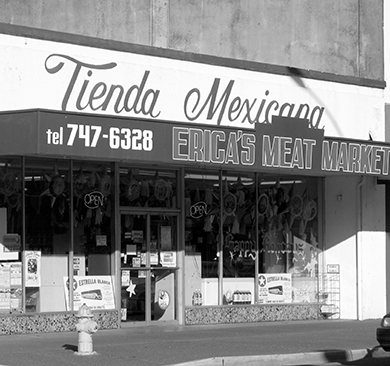 According to the 2010 Census, Latinos now comprise 12 percent of Oregon’s population. Key features of the growing Latino community are Latino small businesses that have now emerged in cities across Oregon. These Latino small businesses help sustain the presence of many Latino and multicultural communities throughout large metropolitan areas and small towns. Therefore, supporting Latino businesses is integral to sustaining Latino populations.
According to the 2010 Census, Latinos now comprise 12 percent of Oregon’s population. Key features of the growing Latino community are Latino small businesses that have now emerged in cities across Oregon. These Latino small businesses help sustain the presence of many Latino and multicultural communities throughout large metropolitan areas and small towns. Therefore, supporting Latino businesses is integral to sustaining Latino populations.
This trend is evident in our own backyard, as there is a growing presence of Latino small businesses (e.g. small restaurants, food carts, and tienditas) in the Eugene/Springfield area, yet little is known about how, and to what extent, these small businesses contribute to local tax bases and spur economic development. Even less is known about the types of support that state, regional and local governments, and even private financial institutions are providing to sustain these emerging businesses. Consequently, many barriers exist to connecting Latino small business to the necessary resources that can support their sustainability.
CLLAS provided support to this project via a faculty collaboration award given to Dr. Gerardo Sandoval, Department of Planning, Public Policy and Management (PPPM) and Megan Smith of UO’s Community Service Center to begin work around studying this issue. Hence, the project “Sustaining Latino Small Businesses in Eugene and Springfield” is an exploratory project that seeks to fill in this informational void and in turn, find ways to garner more formal, institutional support for Latino small businesses in the area. The purpose of this project is to answer two central questions: 1) What types of barriers do Latino small businesses in Eugene and Springfield face in maintaining their sustainability? 2) What kinds of opportunities and services are available to the businesses to help them overcome these barriers?
A key part of this project was to engage students from Dr. Sandoval’s Urban Community Revitalization course in investigating these topics on a local level as part of a community-oriented, exploratory class project. The information that students gained throughout the winter term was obtained through informal conversations with business owners/employees on site at their businesses, conversations with local entities that provide services to small businesses, and through a focus group of small business owners at Centro Latino-Americano in collaboration with the City of Eugene Neighborhoods Division.
As the project progressed, several themes and trends surfaced regarding how these businesses started, how they are sustained, and to what extent language barriers limit communication between Latino small businesses and the private and public entities that provide resources to support them.
Most of the Latino small business owners that we spoke with reported to have used all of their own (or their family’s) capital to start their businesses. They did not receive loans from banks, nor did they receive financial or resource assistance from outside entities at the city or from nonprofit organizations. Only one business owner that we spoke with claimed to have applied for a loan. However, he was denied the loan because he did not have the necessary assets, and he did not understand what he needed to do in order to develop a “business plan” that the bank required for the loan.
Many of these small businesses had few employees, unusually high rents to pay, and received little support from their landlords when it came to making infrastructure improvements (e.g. providing lighting in dark alleyways surrounding the business, expanding the supply of parking, making physical repairs to the building and storefront to keep structures up to code). Some businesses complained that the cities’ codes were too rigid and served as a barrier to their storefront marketing efforts.
The majority of the business owners had little to no knowledge of the resources that the city of Eugene and/or the city of Springfield offer to small business. As we spoke with relevant departments and personnel at the City of Eugene, the City of Springfield, and at nonprofits dedicated to small business development and assistance, we found that there was an overall lack of resources and services available in Spanish. Therefore, these agencies and institutions seem to be struggling to communicate effectively with the Latino small business community—this is partially because of resource and funding shortages.
Throughout this exploratory research we identified specific needs that Latino small businesses were facing and the difficulties that exist in trying to bring resources to these businesses. Entities that provided resources seem to struggle to communicate with Latino small business owners the services available to them or to tailor a specific business outreach strategy to the particular business context they were working under. Similarly, because of the language barriers and lack of information regarding resources, Latino small businesses seem to struggle to establish relationships with the entities that have the potential to provide them with the resources that they need. Hence, we look forward to further investigating these issues in order to bridge the communication and resource gaps that perpetuate the struggles that Latino small businesses face in Eugene and Springfield and in other Oregon communities.
—by Dr. Gerardo Sandoval, Joanna Bernstein, and Monique Lopez, Department of Planning, Public Policy and Management (PPPM)
